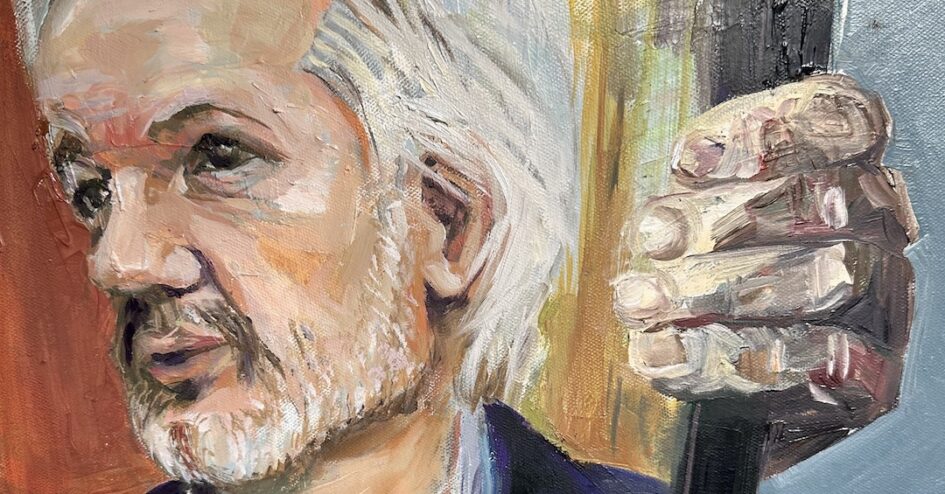Caitlin Johnstone
Seven progressive Democrats from the House of Representatives have signed a letter to Attorney General Merrick Garland calling for the Biden administration to drop the charges against Julian Assange and cease seeking his extradition.
It’s a good letter as far as these things go. It lists the major press freedom advocacy groups and human rights watchdogs who have called for Assange to be released, correctly identifies the threats this case poses to press freedoms around the world, and avoids sneaking in any of the classic smears against Assange that normally work their way into high-level mainstream objections to the persecution of the WikiLeaks founder. It’s an undeniably good thing that this letter happened.
That said, I’d like to bump this portion of the letter into the spotlight for a moment and highlight a some bits for emphasis:
The prosecution of Julian Assange for carrying out journalistic activities greatly diminishes America’s credibility as a defender of these values, undermining the United States’ moral standing on the world stage, and effectively granting cover to authoritarian governments who can and do point to Assange’s prosecution to reject evidence-based criticisms of their human rights records and as a precedent that justifies the criminalization of reporting on their activities.
Leaders of democracies, major international bodies, and parliamentarians around the globe stand opposed to the prosecution of Assange. Former United Nations Special Rapporteur on Torture Nils Melzer and the Council of Europe’s Commissioner for Human Rights Dunja Mijatović have both opposed the extradition. Australian Prime Minister Anthony Albanese has called on the U.S. government to end its pursuit of Assange. Leaders of nearly every major Latin American nation, including Mexican President Andrés Manuel López Obrador, Brazilian President Luiz Inácio Lula da Silva, and Argentinian President Alberto Fernández have called for the charges to be dropped. Parliamentarians from around the world, including the United Kingdom, Germany, and Australia, have all called for Assange not to be extradited to the U.S.
This global outcry against the U.S. government’s prosecution of Mr. Assange has highlighted conflicts between the America’s stated values of press freedom and its pursuit of Mr. Assange. The Guardian wrote “The US has this week proclaimed itself the beacon of democracy in an increasingly authoritarian world. If Mr. Biden is serious about protecting the ability of the media to hold governments accountable, he should begin by dropping the charges brought against Mr. Assange.” Similarly, the Sydney Morning Herald editorial board stated, “At a time when US President Joe Biden has just held a summit for democracy, it seems contradictory to go to such lengths to win a case that, if it succeeds, will limit freedom of speech.”
This to my mind is the most impactful part of the letter, in the sense that it’s the part that’s most likely to actually grab the attention of those responsible for Assange’s ongoing persecution. Indeed, it appears to have been deliberately crafted to do so.
Imprisoning Assange in Belmarsh while working toward the unprecedented step of trying a publisher under the Espionage Act does indeed undermine the United States’ moral standing on the world stage, and does indeed grant governments the US doesn’t like the ability to dismiss Washington’s hand-wringing about human rights as cynical performative hypocrisy. But while the authors of the letter to Biden’s attorney general frame this as something illegitimate that is done contrary to facts in evidence, in reality the moral authority of the United States to criticize the human rights records of foreign nations has been irreparably destroyed. Not just within the reality tunnels of foreign propagandists, but in actuality.
When people talk about “moral authority” it’s often in an abstract, philosophical way, like it’s a matter of logical coherence: “You’ve no moral authority on this subject because you are a hypocrite and your stated position contradicts your own actions.” Like it’s just an argument about whether the correct intellectual checkboxes have been ticked, and if they have not it means you get to wag your finger at them and declare a mental checkmate. But the question of moral authority boils down to something much more tangible than that.
Moral authority is a measure of one’s qualifications for leadership on moral matters. If I am known as a moral person who makes moral decisions, it makes sense for people to look to me for leadership on questions of morality. If I am known as an immoral person, then nobody’s coming to me for moral guidance, because they understand that I do not have the qualifications for that role.
So when people try to frame Assange’s persecution as a matter of public perception and fighting foreign narratives about the US, they are incorrect. The issue is not that Assange’s persecution makes the US look bad, the issue is that it proves the US is bad.
And of course we didn’t really need Assange’s persecution to figure that out for ourselves. The US is the only government on earth who has spent the 21st century killing people by the millions in wars for geostrategic dominance, who’s been strangling populations with starvation sanctions and blockades around the world, who is circling the planet with hundreds of military bases with the goal of global domination, and who’s been continually increasing the risk of nuclear armageddon with its rapidly escalating agendas geared toward securing unipolar hegemony. Assange’s case just makes its complete lack of moral standing much clearer.
This will all still be the case even if Assange is released. The US empire will still have spent years imprisoning a journalist for the crime of good journalism, will still be the world’s worst warmonger, and will still be the world’s most egregious violator of human rights. Its moral standing is dead and buried, and the world should stop following its lead in creating a just and ethical world. It simply does not have the qualifications to do so. In fact, no power structure on earth is less qualified.

